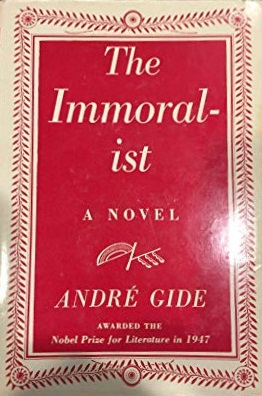"Man and Superman"-The Immoralist, Andre Gide-A Book Review
BOOK REVIEW
The Immoralist, Andre Gide, Penguin Classics, New York, 2001
Andre Gide was always justly famous for writing tight little novels that presented unusual moral dilemmas that did not, as in real life, necessarily get resolved or resolved in a way that one would think. That is the case here with one of his early and perhaps most famous offerings. The story line centers on the bedraggled life of a consummate French bourgeois scholar who is going through a personal crisis after the death of his father and his unsought `shot gun' marriage in the early part of the 20th century. The newly weds travel to various exotic outposts of French imperialism, including the dry Northern African coast. Along the way he becomes sick with a life-threatening illness but by an act of will, and the extraordinary care of his new wife, overcomes that crisis. As a result of her loving efforts she in turn gets sick (during her pregnancy). He is decidedly inattentive to her illness. The scholar, in the final analysis, permits her to die by his self-centered actions.
Now, after his illness, and as a result of overcoming that experience the scholar begins to believes that he is `superman' a la Nietzsche and therefore consciously or unconsciously becomes the agent of his wife's descend into greater illness and eventually death. Quite a dilemma, to be sure, but he is not crying over it. The real question here is whether, in a hard and unforgiving world where each person is his or her own agent, that it was his duty to thoughtfully care for his wife or whether his need to take actions to `understand' himself was paramount.
Some other moral questions concerning his role as landlord in his inherited rural estate pop up along the way, as well. Also, just a hint of homosexual tension in his dealings with the young Arab boys in the neighborhood hovers in the background. This is a subject that then was almost always covered in discreet language so it is hard to tell the full extent of the attraction. And whether he did anything about it. This is a question that concerned Gide personally, as well.
I would note that this theme (and the sub theme of homosexuality) and the book itself at the start of the 20th century may have been somewhat scandalous but reading it after some of the harrowing events done by humankind in the last century has cut deeply into the impact that it was intended to have. Still it is a great book and a quick read. Any lessons to be drawn about the dark side of human nature, as it has evolved thus far, take a lot longer.
BOOK REVIEW
The Immoralist, Andre Gide, Penguin Classics, New York, 2001
Andre Gide was always justly famous for writing tight little novels that presented unusual moral dilemmas that did not, as in real life, necessarily get resolved or resolved in a way that one would think. That is the case here with one of his early and perhaps most famous offerings. The story line centers on the bedraggled life of a consummate French bourgeois scholar who is going through a personal crisis after the death of his father and his unsought `shot gun' marriage in the early part of the 20th century. The newly weds travel to various exotic outposts of French imperialism, including the dry Northern African coast. Along the way he becomes sick with a life-threatening illness but by an act of will, and the extraordinary care of his new wife, overcomes that crisis. As a result of her loving efforts she in turn gets sick (during her pregnancy). He is decidedly inattentive to her illness. The scholar, in the final analysis, permits her to die by his self-centered actions.
Now, after his illness, and as a result of overcoming that experience the scholar begins to believes that he is `superman' a la Nietzsche and therefore consciously or unconsciously becomes the agent of his wife's descend into greater illness and eventually death. Quite a dilemma, to be sure, but he is not crying over it. The real question here is whether, in a hard and unforgiving world where each person is his or her own agent, that it was his duty to thoughtfully care for his wife or whether his need to take actions to `understand' himself was paramount.
Some other moral questions concerning his role as landlord in his inherited rural estate pop up along the way, as well. Also, just a hint of homosexual tension in his dealings with the young Arab boys in the neighborhood hovers in the background. This is a subject that then was almost always covered in discreet language so it is hard to tell the full extent of the attraction. And whether he did anything about it. This is a question that concerned Gide personally, as well.
I would note that this theme (and the sub theme of homosexuality) and the book itself at the start of the 20th century may have been somewhat scandalous but reading it after some of the harrowing events done by humankind in the last century has cut deeply into the impact that it was intended to have. Still it is a great book and a quick read. Any lessons to be drawn about the dark side of human nature, as it has evolved thus far, take a lot longer.

No comments:
Post a Comment